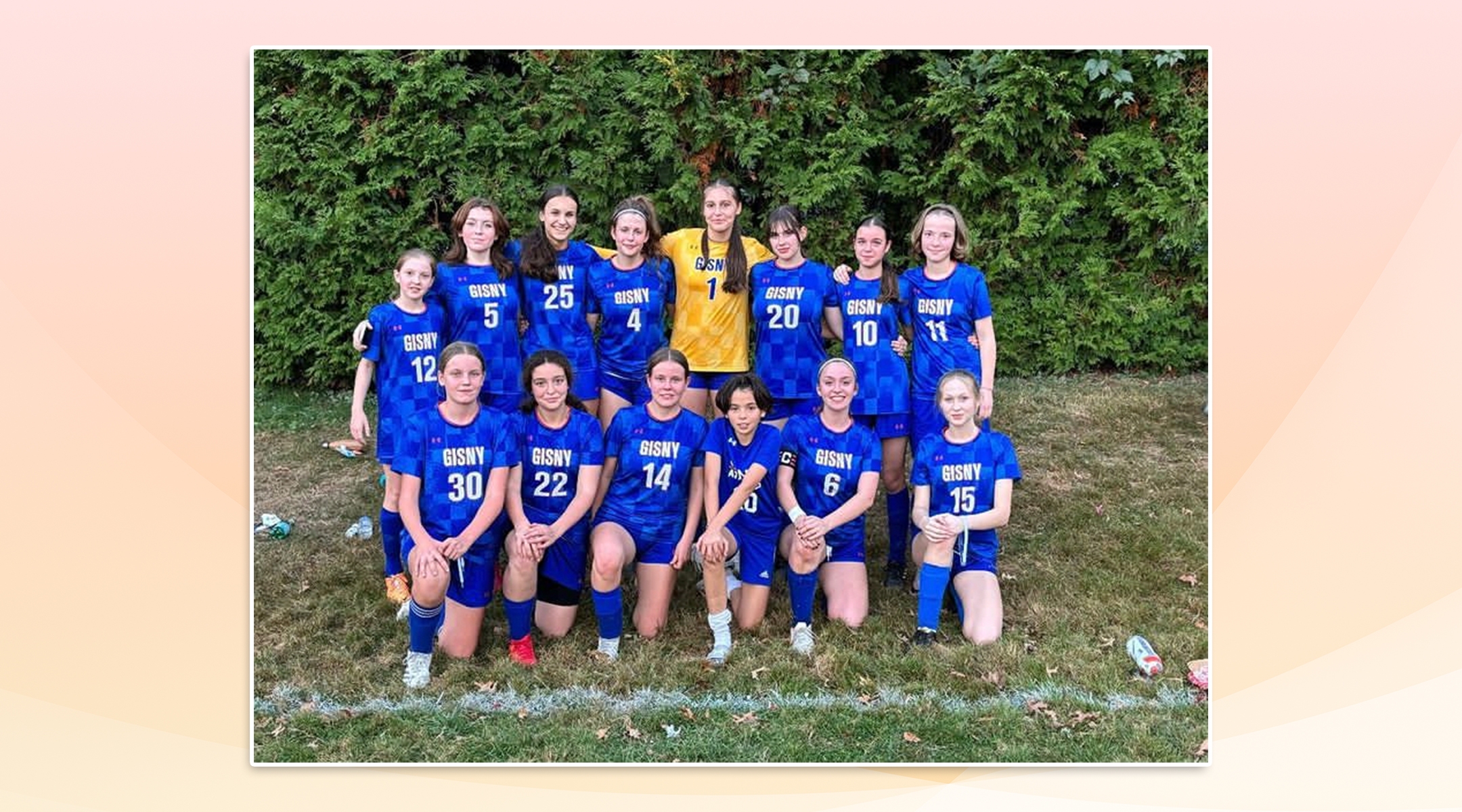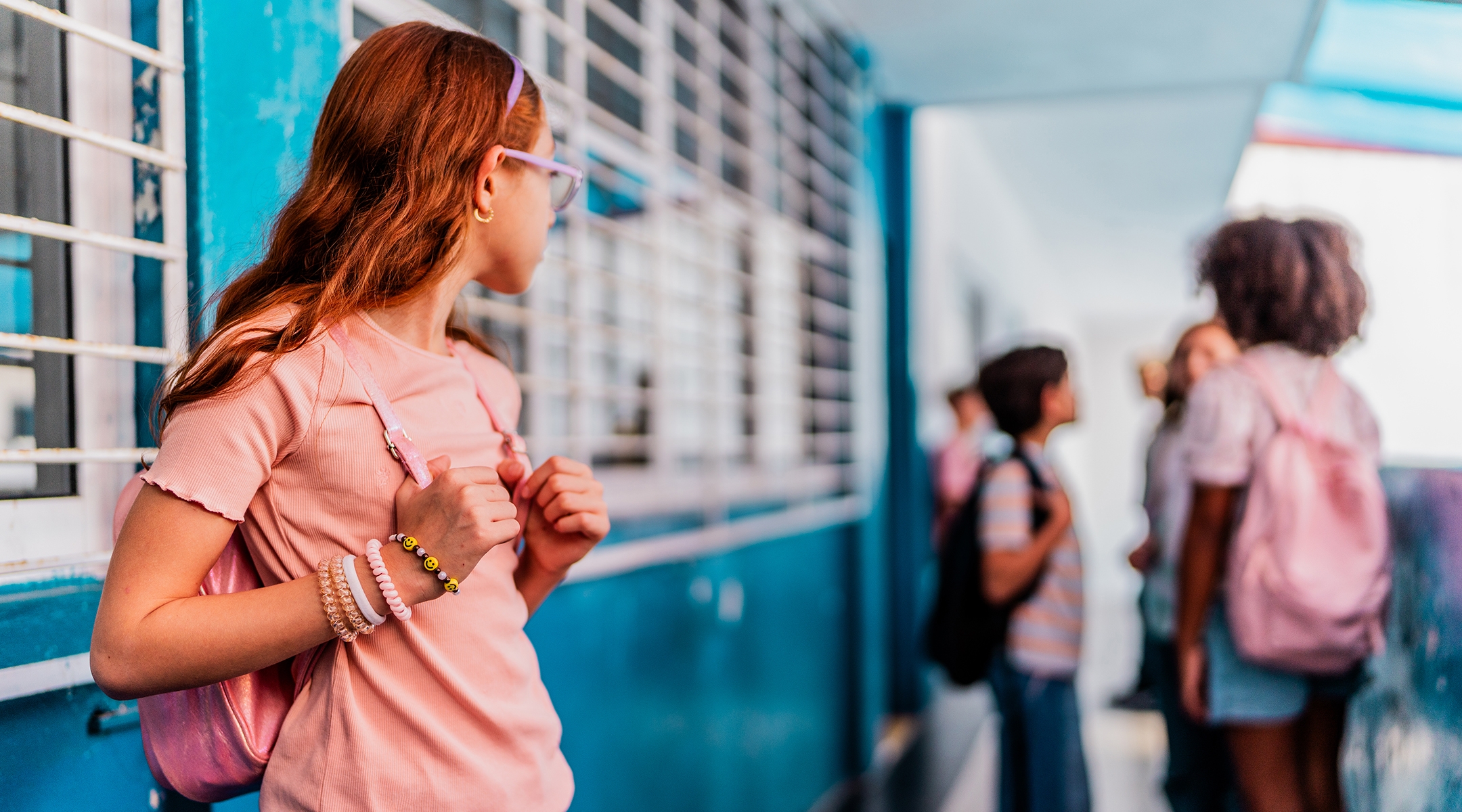This article was produced as part of the New York Jewish Week’s Teen Journalism Fellowship, a program that works with Jewish teens around New York City to report on issues that affect their lives.
Since I’d started as a preschooler at the German International School New York, it had never mattered much that I was the only Jewish girl on campus. My Jewish identity just wasn’t something that I, or anyone else at school, gave much thought to.
Then, in fourth grade, a couple of my classmates thought it would be funny to construct swastikas out of toy building blocks. Soon it turned into “Adolf Hitler” being scrawled on the cover of my math workbook, and after that to me being called “Jewey” in the classroom. I knew what they were doing was wrong, even if as a 9 year old I couldn’t really articulate why. This was way beyond “boys just being boys.”
It became clear to me just how wrong it was when the head of GISNY’s lower school was moved to tears upon learning what had happened. For a school like mine, it was never a question of whether something should be done. Rather, it was a question of how strongly to react, where to set the boundaries, and what lessons to take away.
Though my school, which runs from pre-kindergarten through 12th grade, is located in suburban Westchester County, its bilingual curriculum comes directly from Germany, as do the majority of its 400 students and most of the faculty. It is a German school in every sense of the word, and just as in Germany, GISNY students start learning about the Holocaust in middle school.
These lessons about Germany’s dark past are a part of a process known in German as Vergangenheitsbewältigung, a word that is literally translated as “coming to terms with the past” but colloquially understood to mean German society’s reckoning with the legacy of the Holocaust. It is a process made all the more complicated by the universal and eternal challenge of teaching young children right from wrong. We were just fourth graders, after all.
The building-block boys were required to attend regular meetings with the head of the lower school, where they were given in-depth lessons about the Holocaust. They were also taught more basic manners that they probably should’ve already acquired by that age, like not being a jerk to your classmate. At the end of their sessions, they wrote me an apology letter.
I still have that crinkled paper today, nestled in a drawer between birthday cards and photo booth pictures. “The Jews suffered horribly and we shouldn’t make fun of it,” the boys scrawled in handwritten German. “We also talked about it with our parents. We learned a lot!”

Writer Lily Rawls, second from right in the front row, and her soccer teammates at the German International School New York. (Courtesy)
As a sophomore in high school, I now recognize that GISNY tried to meet that problematic moment on a practical level, not just a performative one. The focus was on education, not just punishment.
There was no sweeping things under the rug. But at the same time, there were also no overwrought histrionics, no rushing to sound the alarm about antisemitism. Instead, there was a committed attempt to deal thoughtfully with what was indisputably an unprecedented incident for the school and the community it served.
And unprecedented the incident indisputably was: There had never been any Jewish students at my school before my family came. My two brothers and I were the first Jewish students to study at GISNY. I was the first Jew more than a few of my classmates had met.
My family has always been very “Jewey,” though not in the small-minded way my fourth-grade classmates categorized me. Both of my parents have spent years working for and with Jewish institutions. My Jewish mother was born and raised in Vienna; her father spent the first two years of his life hiding from the Nazis. All of my father’s family is in Israel, where they have been for generations. My older cousins on that side of the family have all served in the army, including in Gaza and Lebanon since October 7.
So how did proud Jewish kids from the city like us end up at a bilingual German school in White Plains? Having my mother’s tongue as my mother tongue was a priority for my parents from my earliest days. And for good reason: My mother’s family has been living in the German language since the heyday of the Habsburg monarchy.
GISNY offered a path for a native-level bilingual education, and that is how Ben, Sammy and I came to spend our school years riding a bus from Upper Manhattan to the suburbs. It’s the only academic home I’ve known since I was 4 years old.
I realized at a very young age that my German-speaking world and my Jewish world didn’t necessarily understand each other — and that settling for simplistic binaries was not going to help me figure out life’s inevitable differences and disagreements. So I made my supposedly incompatible identities my responsibility. Being one didn’t necessarily exclude the other, and it was on me to figure out a way to bridge the gap.
Holiday season has been an easy one to adapt to. Every December, as Christmas fever takes over the school community, I share in the excitement. I’ve helped sell Christmas tree ornaments at my school’s winter bazaar, eaten my daily Advent calendar chocolate with my classmates, and played Mariah Carey’s “All I Want for Christmas Is You” on bass guitar with the GISNY band.
But when a scheduling snafu led to a week-long class trip to Cape Cod falling on Yom Kippur, my family and I made it clear that it was problematic for me when approached about it by my teacher and principal. And to the school’s credit, the trip was delayed a day in order to respect our observance of the holiday.
Talking on campus about delicate Jewish topics — whether everyday matters like holidays, or issues that cut closer to the heart — is not always simple, or easy. But engaging in occasionally uncomfortable discussions has allowed us to find a more authentic way forward from our inextricably intertwined history. And in the process, it has helped me navigate a path through today’s hyper-tense world, where even the most innocuous words can devolve into outright hostility.
Since Oct. 7, my school has been one of the few non-Jewish spaces where I’ve felt safe openly wearing my Magen David necklace. Everywhere else, I tuck it under my shirt. Part of me feeling comfortable on campus has indubitably been due to the school community’s efforts, consciously or not, to normalize my family’s presence. But part of it has unquestionably been because I’ve owned my family’s complex background and how that shapes who I am and how others interact with me.
That mindset has gotten me, half a dozen years after being harassed with building-block swastikas, to this good place: The only thing remarkable about a Jewish girl like me growing up at a German school like mine is that it is not remarkable at all.
The New York Jewish Week brings you the stories behind the headlines, keeping you connected to Jewish life in New York. Help sustain the reporting you trust by donating today.





